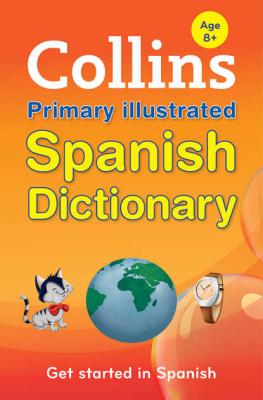Collins Primary Dictionaries. Collins Dictionaries
Чтение книги онлайн.
Читать онлайн книгу Collins Primary Dictionaries - Collins Dictionaries страница 59
 there is/there are
there is/there are
Language tip
hay has two meanings: there is and there are. Look at the examples.
Hay una iglesia en la esquina. There’s a church on the corner. Hay treinta alumnos en mi clase. There are thirty pupils in my class. ¿Hay entradas? Are there any tickets? hay que you must Hay que ser respetuoso. You must be respectful.
la habitación (PL las habitaciones) NOUN
1 bedroom
Ésta es la habitación de mi hermana. This is my sister’s bedroom.
2 room una habitación doble a double room una habitación individual a single room
el/la habitante NOUN
inhabitant los habitantes de la zona people living in the area
hablar VERB
1 to speak ¿Hablas español? Do you speak Spanish?
2 to talk Estuvimos hablando toda la tarde. We were talking all afternoon. ¿Has hablado con el profesor? Have you spoken to the teacher? Solo hablan de fútbol. They only talk about football. ¡Ni hablar! No way!
habré VERB ▷see haber ¿Dónde habré puesto las llaves? Where did I put my keys?
hacer VERB
1 to make Tengo que hacer la cama. I’ve got to make the bed. Estáis haciendo mucho ruido. You’re making a lot of noise.
2 to do ¿Qué haces? What are you doing? Tengo que hacer los deberes. I have to do my homework. Hace mucho deporte. She does a lot of sport. hacer clic en algo to click on something
3 to be Hace calor. It’s hot. hace ago/for
Language tip
When talking about time, hace can mean ago or for. Look at the examples.
Terminé hace una hora. I finished an hour ago. Hace un mes que voy. I’ve been going for a month. ¿Hace mucho que esperas? Have you been waiting long?
■ hacerse to become Quiere hacerse famoso. He wants to become famous.
hacia PREPOSITION
towards Venía hacia mí. He was coming towards me. hacia adelante forwards hacia atrás backwards hacia dentro inside hacia fuera outside hacia abajo down hacia arriba up
hago VERB ▷see hacer Y ahora, ¿qué hago? And now, what do I do?
el hambre NOUN
hunger tener hambre to be hungry No tengo mucha hambre. I’m not very hungry.
la hamburguesa NOUN
hamburger
haré VERB ▷see hacer Lo haré mañana. I’ll do it tomorrow.
hartar VERB
hartarse de algo to get fed up with something Me harté de estudiar. I got fed up with studying.
harto (FEM harta) ADJECTIVE
fed up Estoy harto de repetirlo. I’m fed up with repeating it. ¡Me tienes harto! I’m fed up with you!
hasta
hasta can be a preposition, conjunction or adverb.
A PREPOSITION, CONJUNCTION
till Está abierto hasta las cuatro. It’s open till four o’clock. ¿Hasta cuándo? How long? ¿Hasta cuándo te quedas? — Hasta la semana que viene. How long are you staying? — Till next week. hasta que until Espera aquí hasta que te llamen. Wait here until you’re called.
¡Hasta luego! See you! ¡Hasta mañana! See you tomorrow! ¡Hasta el sábado! See you on Saturday!
B ADVERB
even Estudia hasta cuando está de vacaciones. He even studies when he’s on holiday.
hay VERB ▷see haber Hay tres casas. There are three houses.
haz VERB ▷see hacer Haz lo que quieras. Do whatever you like.
he VERB ▷see haber No he estado nunca en Londres. I’ve never been to London.
hecho
hecho can be an adjective or part of the verb hacer.
A (FEM hecha) ADJECTIVE
made ¿De qué está hecho? What’s it made of? hecho a mano handmade ¡Bien hecho! Well done!
B VERB ▷see hacer Ya lo he hecho. I’ve done it already.
helado
helado can be a noun or an adjective.
A MASC NOUN
ice cream